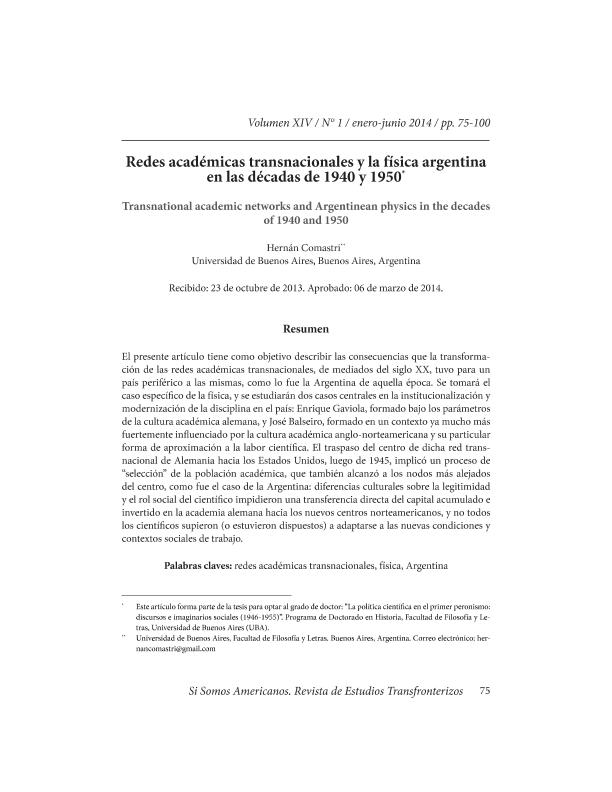Mostrar el registro sencillo del ítem
dc.contributor.author
Comastri, Hernán

dc.date.available
2018-01-12T20:01:14Z
dc.date.issued
2014-06
dc.identifier.citation
Redes académicas transnacionales y la física argentina en las décadas de 1940 y 1950; Universidad Arturo Prat. Instituto de Estudios Internacionales; Si somos americanos; 14; 1; 6-2014; 75-100
dc.identifier.issn
0718-2910
dc.identifier.uri
http://hdl.handle.net/11336/33164
dc.description.abstract
Este trabajo se propone como objetivo reconstruir las redes que relacionaban a la comunidad de físicos en la Argentina (o, al menos, a algunos de sus más claros exponentes, como los argentinos Enrique Gaviola y José Balseiro, o los alemanes Guido Beck y Richard Gans) de las décadas de 1940 y 1950, rescatando en paralelo la posición de las mismas al interior de redes más amplias de carácter internacional. El período resulta de especial riqueza para el análisis por las dinámicas que lo atravesaron tanto a nivel nacional como internacional. En el plano local, el peronismo en el poder buscó reorganizar el conjunto de las instituciones científicas de acuerdo a nuevos criterios y, de hecho, representó una amenaza para la supervivencia de redes ya establecidas bajo otros criterios de organización. En el plano internacional, el fin de la Segunda Guerra Mundial marcó un progresivo corrimiento del ?centro? de la física mundial, desde Alemania hacia los Estados Unidos, potencia que, por otra parte, se enfrentó abiertamente al gobierno de Perón. Un análisis diacrónico de estas redes académicas y profesionales, entonces, permitirá observar el proceso mediante el cual las mismas se adaptaron a su nuevo contexto, así como las consecuencias que ello trajo aparejado.
dc.description.abstract
The present article has the objective of describing the consequences that the transformation of the transnational academic networks of the mid twentieth century had on a peripheral country such as Argentina. The specific case of physics will be presented, as well as two figures that were central to the process of modernization of the discipline in that country: Enrique Gaviola, trained in German academic culture, and José Balseiro, trained in a context much more influenced by Anglo-American academic culture. The movement of the center of such a transnational academic network from Germany to the United States, implied a process of "selection" among the academic population that also reached Argentina: cultural differences over the legitimacy and the social function of the scientist, prevented a direct transfer of the capital accumulated and invested in the German academy to the new American centers, and not all the scientists were able to adapt (or accept) to their new labor conditions and social positions.
dc.format
application/pdf
dc.language.iso
spa
dc.publisher
Universidad Arturo Prat. Instituto de Estudios Internacionales
dc.rights
info:eu-repo/semantics/openAccess
dc.rights.uri
https://creativecommons.org/licenses/by-nc-sa/2.5/ar/
dc.subject
Ciencia
dc.subject
Fisica
dc.subject
Peronismo
dc.subject
Transnacional
dc.subject.classification
Historia

dc.subject.classification
Historia y Arqueología

dc.subject.classification
HUMANIDADES

dc.title
Redes académicas transnacionales y la física argentina en las décadas de 1940 y 1950
dc.title
Transnational academic networks and Argentinean physics in the decades of 1940 and 1950
dc.type
info:eu-repo/semantics/article
dc.type
info:ar-repo/semantics/artículo
dc.type
info:eu-repo/semantics/publishedVersion
dc.date.updated
2018-01-10T20:27:57Z
dc.journal.volume
14
dc.journal.number
1
dc.journal.pagination
75-100
dc.journal.pais
Chile

dc.journal.ciudad
Santiago de Chile
dc.description.fil
Fil: Comastri, Hernán. Consejo Nacional de Investigaciones Científicas y Técnicas. Oficina de Coordinación Administrativa Saavedra 15. Instituto de Historia Argentina y Americana "Dr. Emilio Ravignani". Universidad de Buenos Aires. Facultad de Filosofía y Letras. Instituto de Historia Argentina y Americana "Dr. Emilio Ravignani"; Argentina
dc.journal.title
Si somos americanos
dc.relation.alternativeid
info:eu-repo/semantics/altIdentifier/url/http://www.redalyc.org/html/3379/337931455005/
dc.relation.alternativeid
info:eu-repo/semantics/altIdentifier/doi/http://dx.doi.org/10.4067/S0719-09482014000100005
dc.relation.alternativeid
info:eu-repo/semantics/altIdentifier/url/http://ref.scielo.org/7qs5hq
Archivos asociados
